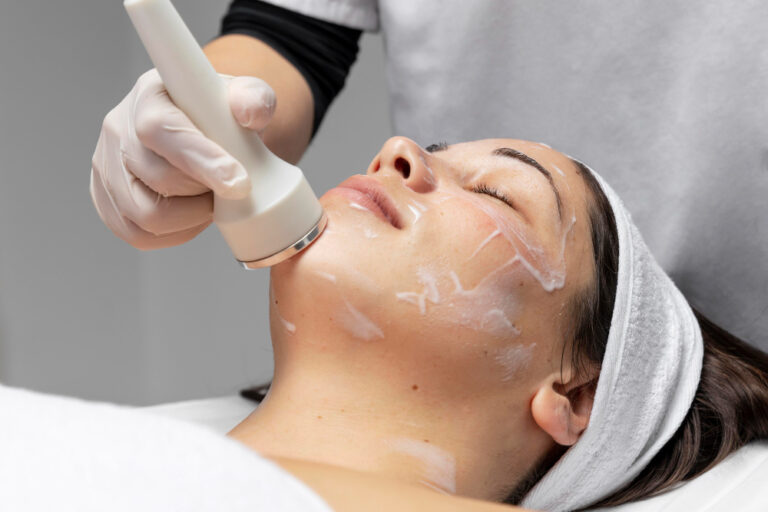
Chemical peels have become increasingly popular in the world of skincare, offering a wide range of benefits for individuals looking to improve their skin’s appearance and texture. If you’re considering a chemical peel but find the array of options overwhelming, this guide will help you navigate the different types of chemical peels available and choose the one that suits your needs.
Introduction to Chemical Peel
Before delving into the specifics, let’s establish a foundational understanding of what chemical peels are and why they matter in the realm of skincare. Chemical peel are cosmetic treatments designed to exfoliate the skin’s top layer, resulting in a smoother, more youthful complexion. They can address various skin concerns, making them a versatile choice for many.
What Are Chemical Peel?
Chemical peels involve the application of a chemical solution to the skin’s surface. This solution causes controlled exfoliation, removing dead skin cells and stimulating the growth of new, healthier skin. These treatments are effective for treating a range of skin issues, from fine lines and wrinkles to acne and uneven skin tone.
Types of Chemical Peels
There are three primary categories of chemical peels, each varying in depth and intensity:
Superficial Peels
Superficial peels are the mildest option and are often used for brightening the skin’s appearance and treating minor imperfections. They typically contain alpha-hydroxy acids (AHAs) or beta-hydroxy acids (BHAs).
Medium Peels
Medium peels penetrate deeper into the skin and are effective for addressing moderate skin concerns, such as sun damage and fine lines. Medium peels often involve the use of trichloroacetic acid (TCA), a popular choice among skincare professionals.
Deep Peels
Deep peels are the most intensive and are reserved for severe skin issues like deep wrinkles and scarring. Phenol is the primary ingredient in deep peels, and they require a longer recovery period.
Choosing the Right Chemical Peel
Selecting the appropriate chemical peel depends on your skin type, tone, and the specific concerns you want to address. For tailored skincare advice, it’s a great idea to have a chat with a skincare expert who can provide personalized recommendations.
Skin Types and Tones
Different chemical peels are better suited for various skin types and tones. Your skin’s characteristics play a vital role in determining which peel will be most effective.
Common Skin Issues
Identify your primary skincare concerns, such as aging, acne, or pigmentation, to help guide your choice of chemical peel.
Benefits of Chemical Peels
Chemical peels offer numerous benefits, making them a valuable addition to your skincare routine.
Improved Skin Texture
Chemical peels remove dead skin cells, promoting smoother and more radiant skin.
Reduced Signs of Aging
These treatments can diminish fine lines, wrinkles, and age spots, providing a more youthful appearance.
Acne and Scar Treatment
Chemical peels can effectively reduce acne breakouts and the appearance of scars.
The Chemical Peel Procedure
Understanding what to expect during a chemical peel treatment is essential for a positive experience.
Pre-treatment Preparation
Prepare your skin by following pre-peel instructions provided by your skincare professional.
The Peeling Process
During the treatment, you may experience a tingling or burning sensation as the chemical solution is applied. This discomfort is temporary.
Post-peel Care
After your chemical peel, follow post-treatment instructions to ensure optimal results and minimize side effects.
Safety Considerations
While chemical peels are generally safe, it’s crucial to be aware of potential risks and complications.
Risks and Complications
Possible side effects include redness, swelling, and peeling. Severe complications are rare but can occur.
Aftercare Tips
Following aftercare guidelines will help you heal properly and achieve the best possible outcome.
Consultation with a Professional
Before undergoing a chemical peel, consult with a qualified dermatologist or skincare expert.
Personalized Recommendations
A professional can assess your skin and provide tailored recommendations for the most suitable chemical peel.
At-Home vs. Professional Chemical Peels
Deciding between at-home and professional treatments depends on your preferences and the severity of your skin concerns. While at-home peels are convenient, professional treatments often yield more noticeable results.
Conclusion
In conclusion, chemical peels are a versatile solution for a wide range of skincare concerns. By understanding the different types of chemical peels and their benefits, you can make an informed decision about the best treatment for your skin. Remember to consult with a skincare professional for personalized recommendations to achieve the glowing, youthful skin you desire.
- Ready to deepen your knowledge? Explore our range of expertly crafted for non-surgical medical training to take your learning to the next level. Whether you’re a beginner or an expert, there’s always something new to discover. Check out our courses today! Our Courses
FAQs
- Are chemical peels painful?
- While you may experience some discomfort during the procedure, it is generally tolerable and temporary.
- How long does it take to see results from a chemical peel?
- Results can vary, but many individuals notice improvements in skin texture and tone within a few weeks.
- Can I wear makeup after a chemical peel?
- It’s advisable to avoid makeup immediately after a peel, but your skincare professional will provide guidance on when it’s safe to resume.
- Are chemical peels suitable for all skin types?
- Chemical peels can be adapted to different skin types, but it’s essential to consult with a professional to determine the best option for you.
- How often can I get a chemical peel?
- The frequency of chemical peels depends on the type and your skin’s tolerance. Your skincare professional will recommend an appropriate schedule.
- Author: Uncanny Touch
Join Your Course today
The non-surgical plastic surgery courses are provided by doctors and specialists with British expertise and patent holders.
Free Consultation
Get expert advice and solutions tailored to your needs. Contact us today and discover how we can assist you.
Working Hours
Mon – Fri : 10 AM – 08 PM
© 2020 Uncanny Touch. All rights reserved.